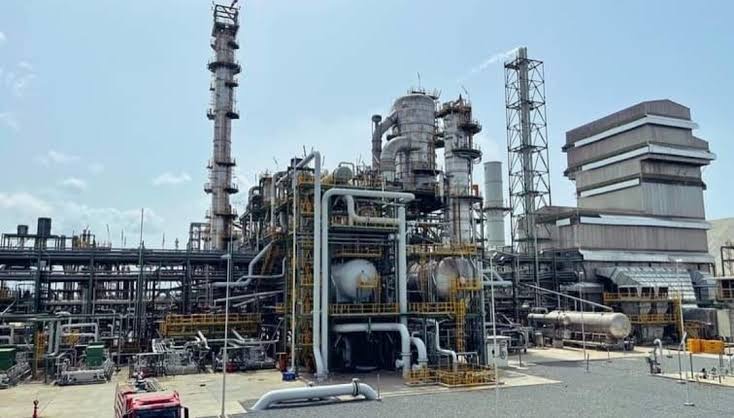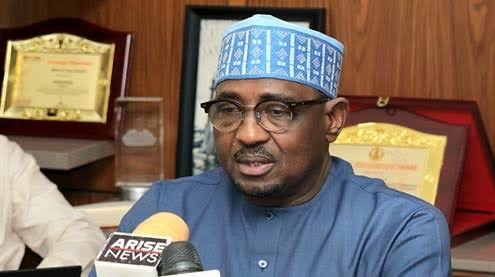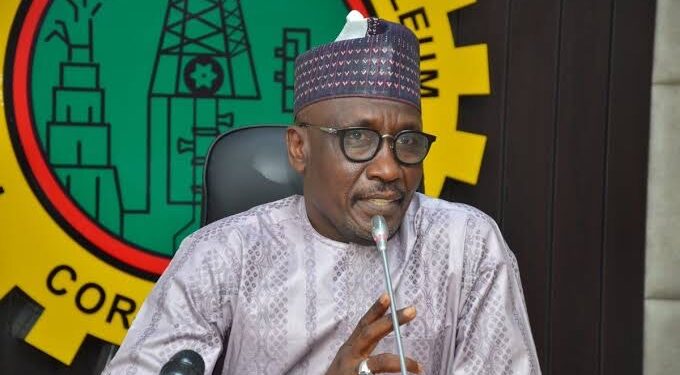The Nigerian Midstream and Downstream Petroleum Regulatory Authority (NMDPRA) on Thursday said the 650,000 barrels per day Dangote refinery is still in the commissioning stage and is yet to be licensed. NMDPRA Chief Executive Officer Farooq Ahmed disclosed this on Thursday in a briefing with State House correspondents.
Ahmed said the refinery’s claim that operations have been halted due to a shortage of crude oil supplies from international oil companies (IOCs) is false.
“Well, just like you rightly asked, there are lots of concerns about the supply of petroleum products nationwide and the claims by some media houses that we were trying to scuttle the Dangote refinery; that is not so.”
“Dangote refinery is still in the pre-commissioning stage. It has not been licenced yet. We have not licensed them yet. I think they are at about 45 percent completion. So we can not rely heavily on one refinery to feed the nation because Dangote is requesting that we should suspend or stop all importation of petroleum products, especially automotive gas oil (AGO) or jet kero, and direct all marketers to the refinery,” Mr Ahmed revealed.
He explained that such expectations are not good for the country’s energy security and also not good for the market because of the monopoly.

“So, in terms of quality, currently, the AGO quality in terms of sulphur is the lowest as far as West Africa’s requirement of 50 parts per million (ppm). Dangote refinery, as well as some major refineries like Waltersmith refinery, produce between 650 ppm to 1,200 ppm. So, in terms of quality, their quality is much more inferior to the imported quality,” he explained.
Last month, Dangote Industries Limited (DIL) Vice President of Oil and Gas, Devakumar Edwin, accused Nigeria’s IOCs of doing everything they can to prevent the survival of Dangote Refinery and Petrochemical Company.
He said the IOCs had deliberately thwarted refineries’ efforts to buy local crude oil by pushing markup prices higher than market prices, thereby forcing refineries to import crude oil from far-flung countries such as the United States, which is costly.
Speaking with a group of energy editors at a one-day training programme organized by the Dangote Group at the time, Edwin lamented the NMDPRA’s practice of indiscriminately issuing licences to those importing dirty refined products into the country. Reacting to the allegations, NMDPRA noted that it took seriously its legal obligations at the time to ensure that only quality petroleum products are supplied and consumed in Nigeria, saying dirty fuels would not be imported into Nigeria.
NMDPRA had in 2020 issued a statement requiring heads of state of the Economic Community of West African States (ECOWAS) to ensure that certain products contain at least 50 parts per million (ppm) of sulphur. On Wednesday, Edwin alleged that IOCs operating in Nigeria have consistently thwarted the company’s demand for locally produced crude oil as feedstock for its refining process.
Edwin’s reaction came against the backdrop of a statement by Gbenga Komolafe, CEO of the Nigerian Upstream Petroleum Regulatory Commission (NUPRC).
Komolafe, in a recent interview, said, “It is ‘erroneous’ for one to say that the IOCs are refusing to make crude oil available to domestic refiners, as the Petroleum Industry Act (PIA) has a stipulation that calls for a willing buyer willing seller relationship.” He explained that IOCs prefer to sell crude oil to international trading companies who then resell it at a margin.
He stressed that cargoes offered by the trading arms of oil companies are sometimes $2 to $4 higher (per barrel) than the official price set by the NUPRC.
On Thursday, the House of Representatives passed a resolution to set up a special committee to investigate the alleged conspiracy by IOCs against refineries.
The resolution follows a motion of urgent public importance filed by the Minority Leader, Kingsley Chinda (PDP, Rivers) on Thursday.
Chinda in his application said the alleged conspiracy had undermined the refinery’s performance as opposed to full optimization.

“The alleged conspiracy against Dangote refinery relates to efforts by the IOCs to deliberately frustrate the refinery’s ability to buy local crude oil by manipulating and increasing the premium price above the market price,” he revealed.
Chinda added, “Whilst the IOCs are keen on exporting raw materials to their home countries and thus creating wealth and employment for their countries, thereby adding to their GDP, Nigeria continues to be a dumping ground for refined products, thus making us dependent on imported petroleum products.”
Therefore, the House of Representatives has called on the Federal Government, NUPRC, the Nigerian Midstream and Downstream Petroleum Regulatory Agency (NMDPRA), and well-meaning Nigerians to support the success of the Dangote Refinery.
The 650,000 barrels per day Dangote Oil Refinery began producing diesel and aviation fuel in January.
Announcing the start of production, the company said the refinery has received six million barrels of crude oil in two SPMs located 25 kilometers offshore.
The first shipment of crude oil will be delivered on December 12, 2023, while the sixth cargo was delivered on January 8.
The company has taken another step towards commencing production of refined petroleum products with the delivery of an additional one million barrels of Bonny Light crude oil from the Nigerian National Petroleum Corporation (NNPC Ltd).
The company began supplying petroleum products to the local market in April. Mr Dangote said last month that Premium Motor Spirit (PMS), popularly known as petrol refined at the refinery, would be launched by July.
NNPC Limited had previously announced plans to acquire a 20% stake in the refinery. But last Sunday, Dangote Group President Aliko Dangote said NNPC Ltd now only owns 7.2% of the refinery’s shares after the company defaulted on paying the balance of its stake that was due in June.
“The agreement was actually 20 percent, which we had with NNPC, and they did not pay the balance of the money up till last year, and then we gave them another extension up till June (2024), and they said that they would remain where they have already paid which is 7.2 percent. So NNPC, the government (sic) owns only 7.2 percent, not 20 percent,” Dangote was quoted as saying
NNPC Ltd confirmed the development in a statement, saying a periodic evaluation of its investment portfolio led to a reduction in its stake in the refinery.
































